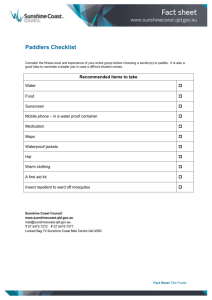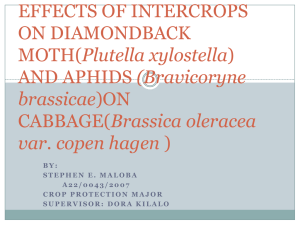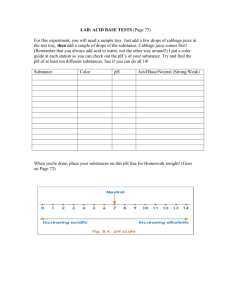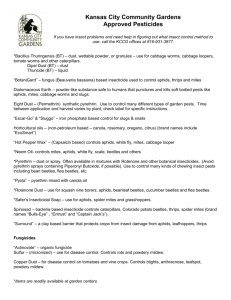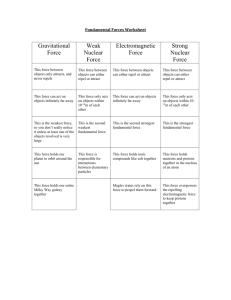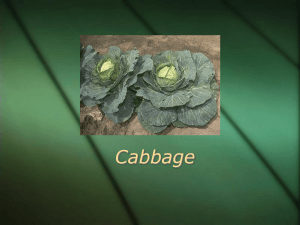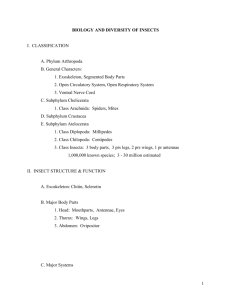COMPANION PLANTING
advertisement
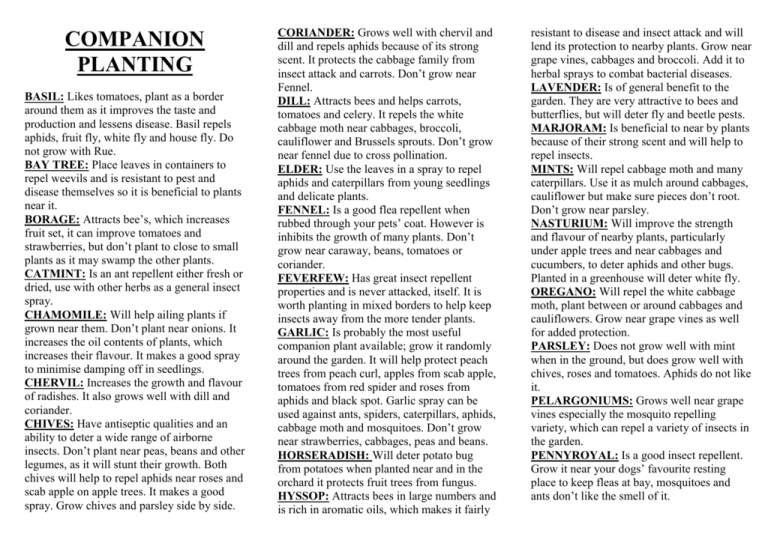
COMPANION PLANTING BASIL: Likes tomatoes, plant as a border around them as it improves the taste and production and lessens disease. Basil repels aphids, fruit fly, white fly and house fly. Do not grow with Rue. BAY TREE: Place leaves in containers to repel weevils and is resistant to pest and disease themselves so it is beneficial to plants near it. BORAGE: Attracts bee’s, which increases fruit set, it can improve tomatoes and strawberries, but don’t plant to close to small plants as it may swamp the other plants. CATMINT: Is an ant repellent either fresh or dried, use with other herbs as a general insect spray. CHAMOMILE: Will help ailing plants if grown near them. Don’t plant near onions. It increases the oil contents of plants, which increases their flavour. It makes a good spray to minimise damping off in seedlings. CHERVIL: Increases the growth and flavour of radishes. It also grows well with dill and coriander. CHIVES: Have antiseptic qualities and an ability to deter a wide range of airborne insects. Don’t plant near peas, beans and other legumes, as it will stunt their growth. Both chives will help to repel aphids near roses and scab apple on apple trees. It makes a good spray. Grow chives and parsley side by side. CORIANDER: Grows well with chervil and dill and repels aphids because of its strong scent. It protects the cabbage family from insect attack and carrots. Don’t grow near Fennel. DILL: Attracts bees and helps carrots, tomatoes and celery. It repels the white cabbage moth near cabbages, broccoli, cauliflower and Brussels sprouts. Don’t grow near fennel due to cross pollination. ELDER: Use the leaves in a spray to repel aphids and caterpillars from young seedlings and delicate plants. FENNEL: Is a good flea repellent when rubbed through your pets’ coat. However is inhibits the growth of many plants. Don’t grow near caraway, beans, tomatoes or coriander. FEVERFEW: Has great insect repellent properties and is never attacked, itself. It is worth planting in mixed borders to help keep insects away from the more tender plants. GARLIC: Is probably the most useful companion plant available; grow it randomly around the garden. It will help protect peach trees from peach curl, apples from scab apple, tomatoes from red spider and roses from aphids and black spot. Garlic spray can be used against ants, spiders, caterpillars, aphids, cabbage moth and mosquitoes. Don’t grow near strawberries, cabbages, peas and beans. HORSERADISH: Will deter potato bug from potatoes when planted near and in the orchard it protects fruit trees from fungus. HYSSOP: Attracts bees in large numbers and is rich in aromatic oils, which makes it fairly resistant to disease and insect attack and will lend its protection to nearby plants. Grow near grape vines, cabbages and broccoli. Add it to herbal sprays to combat bacterial diseases. LAVENDER: Is of general benefit to the garden. They are very attractive to bees and butterflies, but will deter fly and beetle pests. MARJORAM: Is beneficial to near by plants because of their strong scent and will help to repel insects. MINTS: Will repel cabbage moth and many caterpillars. Use it as mulch around cabbages, cauliflower but make sure pieces don’t root. Don’t grow near parsley. NASTURIUM: Will improve the strength and flavour of nearby plants, particularly under apple trees and near cabbages and cucumbers, to deter aphids and other bugs. Planted in a greenhouse will deter white fly. OREGANO: Will repel the white cabbage moth, plant between or around cabbages and cauliflowers. Grow near grape vines as well for added protection. PARSLEY: Does not grow well with mint when in the ground, but does grow well with chives, roses and tomatoes. Aphids do not like it. PELARGONIUMS: Grows well near grape vines especially the mosquito repelling variety, which can repel a variety of insects in the garden. PENNYROYAL: Is a good insect repellent. Grow it near your dogs’ favourite resting place to keep fleas at bay, mosquitoes and ants don’t like the smell of it. PYRETHRUM: Flowers, when dried, are used to make one of the most useful insecticides available. Grow near plants that need extra protection. ROSEMARY: Can be sprinkled fresh or dried around plants to repel snails or slugs and it can keep mosquitoes away. Grows well with sage, cabbage, beans and carrots. Do not grow near potatoes or tomatoes. RUE: Will help to dispel insect problems when planted among vegetable, flowers and shrubs. Snails and slugs also avoid it. Grow it in pots around your house to keep flies away but don’t plant near basil or sage. SAGE: Grows well with rosemary, carrots and cabbage and will help to deter white cabbage moth and carrot fly but do not plant near cucumbers or rue. SANTOLINA: Will benefit roses and dried leaves and flowers can be used as a moth repellent. SAVORIES: Both winter and prostrate are excellent companions to beans and onions. SOUTHERNWOOD: Can be used as a general insect repellent around the garden. Use as a low hedge near eating areas to repel mosquitoes and flies and grown under fruit trees it will help to deter fruit fly. TANSY: Like southernwood it has many insect repellent properties. Planted near your door way will keep flies out of your house. In the garden it deters cutworm, cabbage worms, ants, flies and fruit moth and this, combined with its characteristics of concentrating potassium in the soil makes it a good companion for fruit trees, cabbages, roses, raspberries and grapes. Sprinkled either fresh or dried on kitchen shelves will get rid of even the most determined ants and rubbed into your pets coat will repel fleas. THYME: Should be planted in odd corners of the garden as it attracts bees and is generally of benefit to plants near it. It also repels cabbage moth so it is a useful companion for cabbages. WORMWOOD: Should not be grown to close to other plants but in areas where you need to keep animals out. Plant near fruit trees to deter leaf-eating caterpillars and moths. Dried or made into a tea, it can be sprinkled on the ground to deter snails and slugs. It will also discourage fleas, mosquitoes and mice. YARROW: Like chamomile will improve the health of the plants near to it. It can be made into a tea and poured onto the ground around ailing plants. COMPOST HERBS CHAMOMILE: Is rich in calcium and will stop acidification, thus speeding up the decomposition and ‘sweetening’ the whole mixture. COMFREY: Is rich in potassium, nitrogen, calcium and phosphates and is in fact very similar in chemical composition to farmyard manure. Add to compost or use as a direct fertiliser either in trenches for crops like potatoes or tomatoes, or soak several large leaves in water for a month, strain and use as you would for any liquid fertiliser. DANDELION: Is rich in coper, iron and potash and is useful in accelerating the maturing process. TANSY: Will concentrate potassium in the soil and will speed up decomposition. VALERIAN: Will increase the phosphorous activity in the soil and attract earth worms. It provides rich mineral contents to the compost. YARROW: Will add coper, nitrates, phosphates and potash to the compost or in the soil that it grows in. A few chopped leaves added to each green layer will help in decomposition.
